Unit 5 On the road Developing ideas课件(共29张,内嵌视频) 2025-2026学年 外研版必修第二册
文档属性
| 名称 | Unit 5 On the road Developing ideas课件(共29张,内嵌视频) 2025-2026学年 外研版必修第二册 | 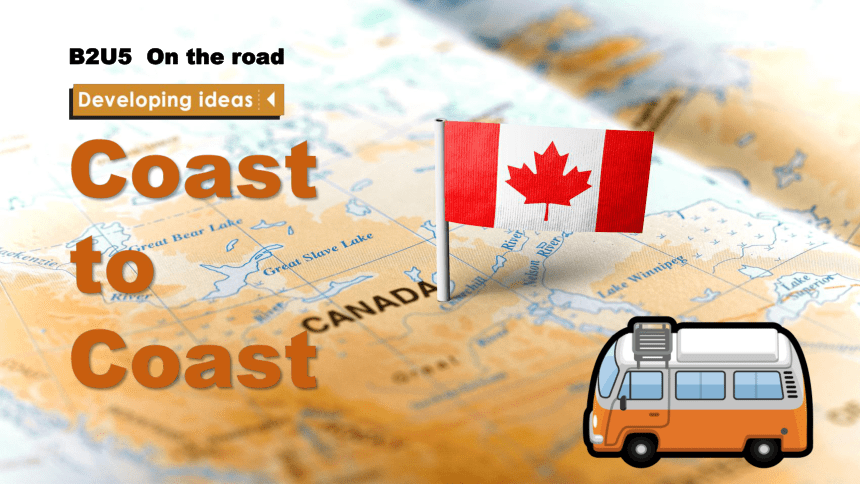 | |
| 格式 | pptx | ||
| 文件大小 | 96.0MB | ||
| 资源类型 | 教案 | ||
| 版本资源 | 外研版(2019) | ||
| 科目 | 英语 | ||
| 更新时间 | 2025-06-17 21:52:08 | ||
图片预览

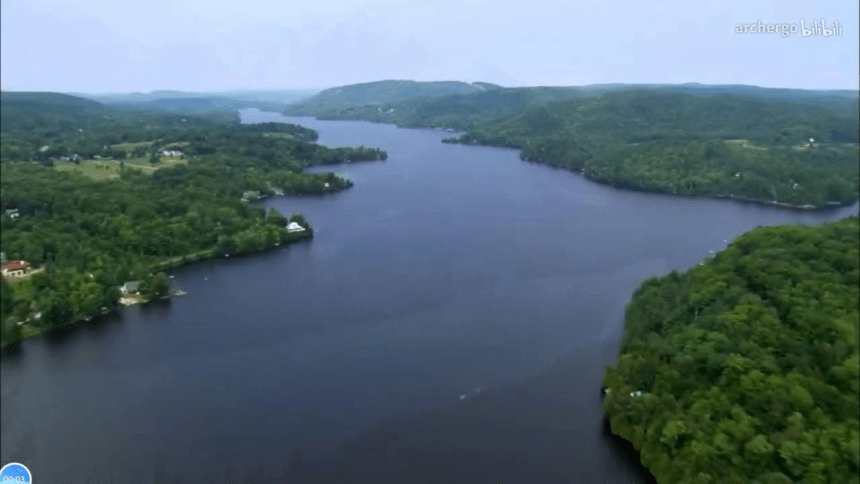
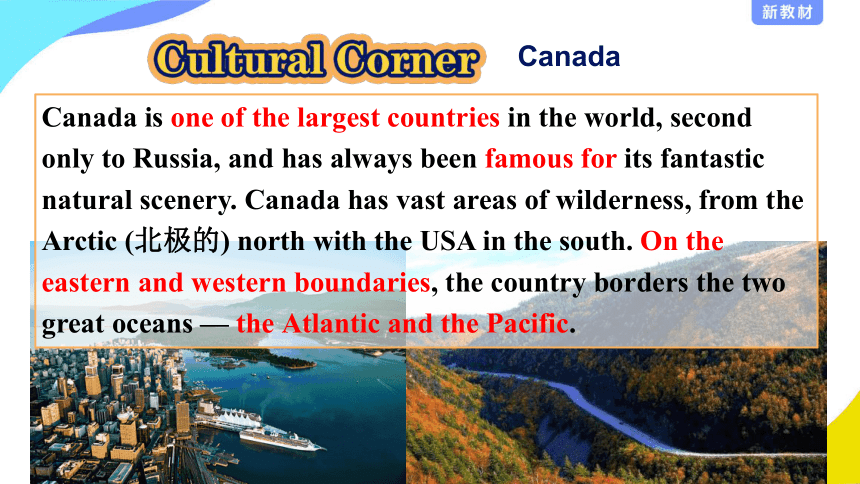
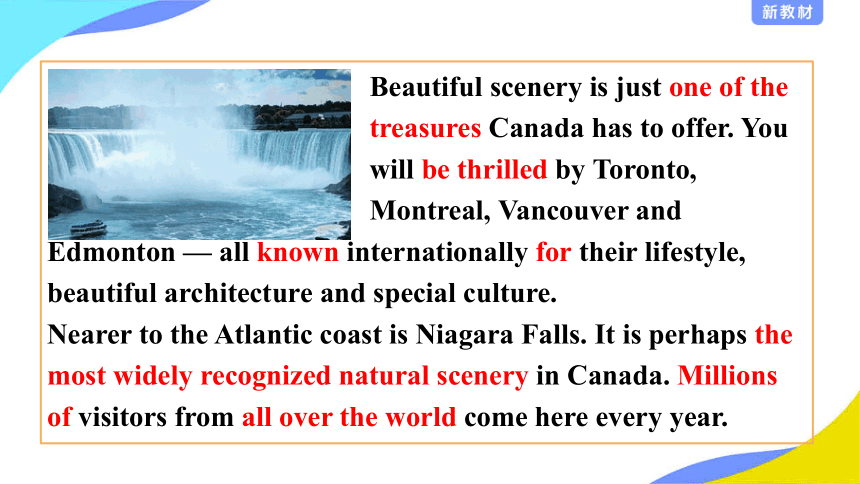
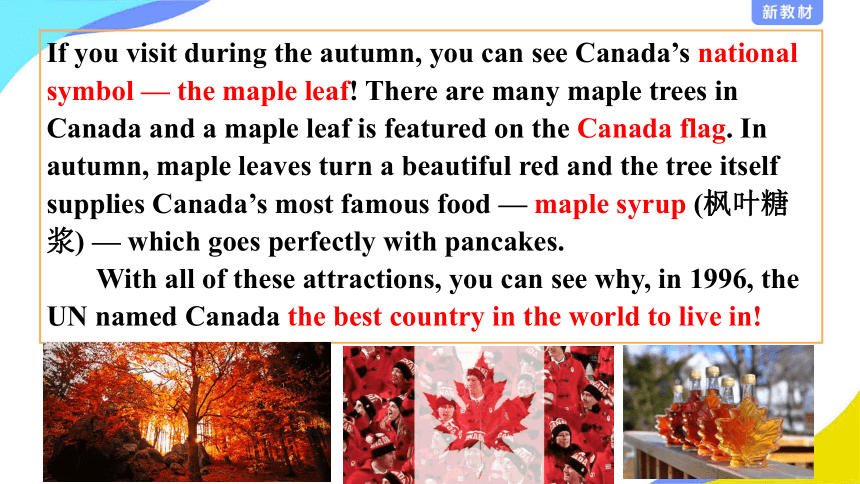
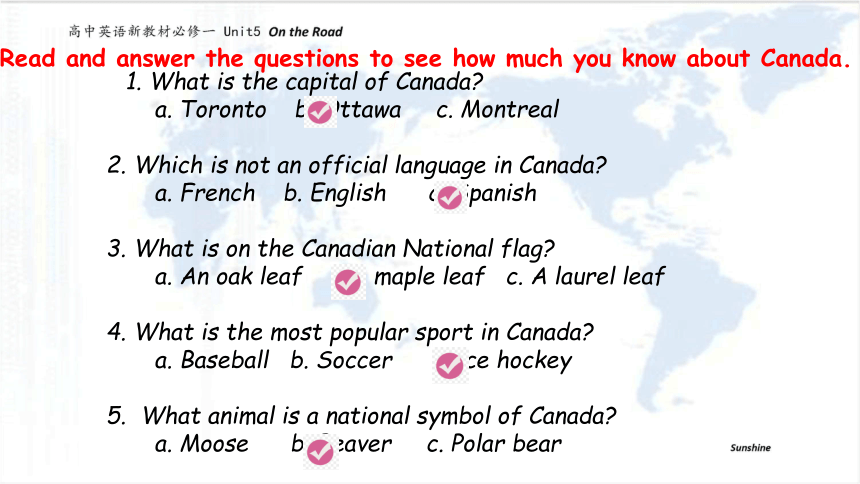
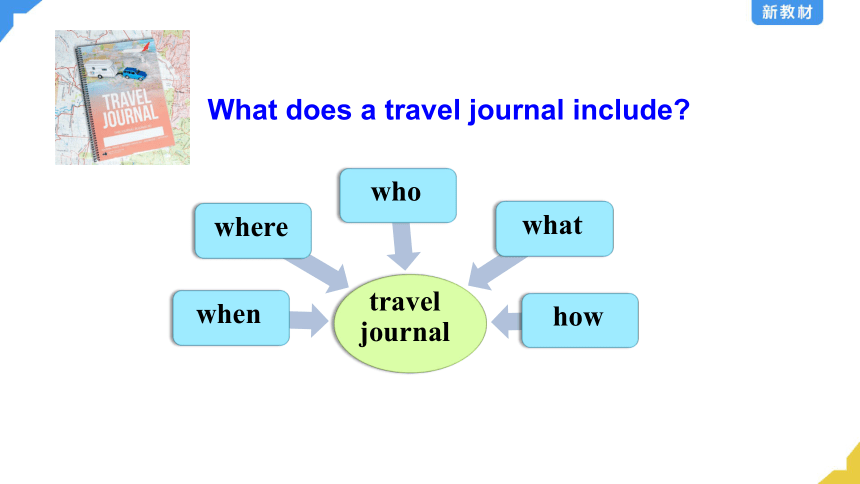
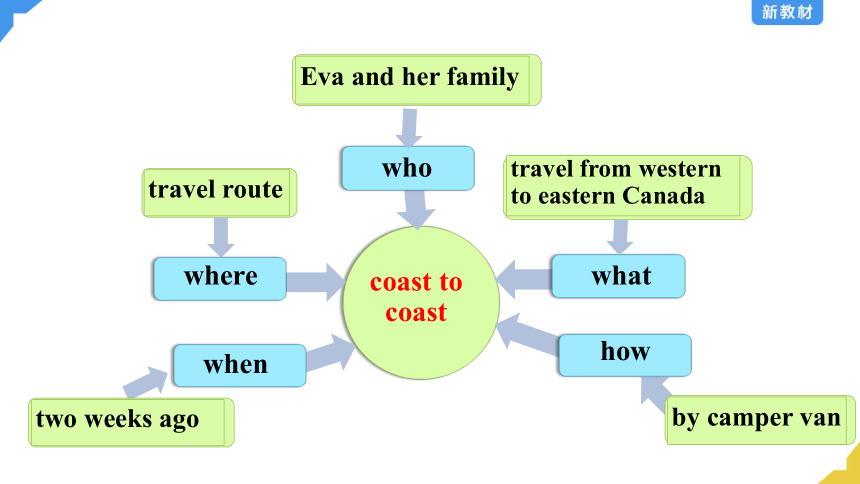
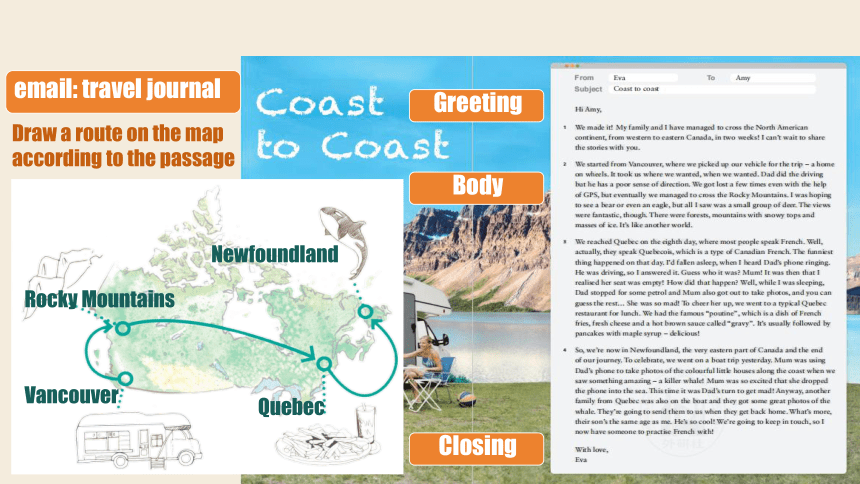
文档简介
(共29张PPT)
B2U5 On the road
Coast
to
Coast
Canada
Canada is one of the largest countries in the world, second only to Russia, and has always been famous for its fantastic natural scenery. Canada has vast areas of wilderness, from the Arctic (北极的) north with the USA in the south. On the eastern and western boundaries, the country borders the two great oceans — the Atlantic and the Pacific.
Beautiful scenery is just one of the treasures Canada has to offer. You will be thrilled by Toronto,
Montreal, Vancouver and
Edmonton — all known internationally for their lifestyle, beautiful architecture and special culture.
Nearer to the Atlantic coast is Niagara Falls. It is perhaps the most widely recognized natural scenery in Canada. Millions of visitors from all over the world come here every year.
If you visit during the autumn, you can see Canada’s national symbol — the maple leaf! There are many maple trees in Canada and a maple leaf is featured on the Canada flag. In autumn, maple leaves turn a beautiful red and the tree itself supplies Canada’s most famous food — maple syrup (枫叶糖浆) — which goes perfectly with pancakes.
With all of these attractions, you can see why, in 1996, the UN named Canada the best country in the world to live in!
Read and answer the questions to see how much you know about Canada.
1. What is the capital of Canada
a. Toronto b. Ottawa c. Montreal
2. Which is not an official language in Canada
a. French b. English c. Spanish
3. What is on the Canadian National flag
a. An oak leaf b.A maple leaf c. A laurel leaf
4. What is the most popular sport in Canada
a. Baseball b. Soccer c.Ice hockey
5. What animal is a national symbol of Canada
a. Moose b. Beaver c. Polar bear
Pre-reading
What does a travel journal include
travel journal
when
where
who
what
how
coast to coast
when
where
who
what
how
Eva and her family
travel from western to eastern Canada
two weeks ago
by camper van
travel route
While-reading
Read for the structure
Greeting
Body
Closing
Draw a route on the map according to the passage
Vancouver
Rocky Mountains
Newfoundland
Quebec
email: travel journal
While-reading
Read for the details
What did they do or see
What problems did they face
How did they feel Why
Vancouver
Rocky Mountains
Newfoundland
Quebec
picked up a motor home
Dad has a poor sense of direction
got lost a few times
saw a small group of deer, forests,
mountains with snowy tops, masses of ice(beautiful scenery)
had lunch in a typical Quebec restaurant.
went on a boat trip
saw a killer whale
Mum dropped Dad’s phone into the sea
Dad lost mom at the petrol station
Excited
Amazed
Funny...
Surprised...
Find out what the underlined words refer to.
Pronouns such as “it”, “this”, “that”, “these”, and “those” are used to make connections between parts of a text. These pronouns may refer to a word, a phrase or a sentence, or even several words, phrases or sentences. They can refer back to previous information or forward to new information.
3
首句“We made it!”中的it引出下文,指代“My family and I have ... in two weeks!”,这里的it是下指。
第二段中,“It took us ...”中的it承接上文,指代名词短语“our vehicle”,it是回指。
第三段中,“The funniest thing happened on that day.”中的that是回指,指代本段首句中的“the eighth”;“How did that happen ”中的that也是回指,指代“I’d fallen asleep, when ... her seat was empty!”,that在语篇上指代上文中的多个句子,意义上指代“接到妈妈的电话,才发现妈妈不在车上”这件事。
指示代词既可以引出下文,也可以总结上文,起着承上启下的作用。
1. It took us where we wanted… (Paragraph 2)
We started from Vancouver, where we picked up our vehicle for the trip – a home on wheels. It took us where we wanted, when we wanted.
2. The funniest thing happened on that day. (Paragraph 3)
We reached Quebec on the eighth day, where most people speak French. Well, actually, they speak Quebecois, which is a type of Canadian French. The funniest thing happened on that day.
3. How did that happen (Paragraph 3)
Guess who is was Mum! It was then that I realilsed her seat was empty! How did that happen
1. Why do you think Eva and her family chose to travel by motor home
2. What do you think Eva enjoyed most about
the trip
3. What do you think was the most memorable
moment of their trip
Post-reading
Think and share
Have you ever travelled with your family Share your experience with the class.
Where you went and who you went with.
Share what you enjoy about the trip.
Describe what problems you faced.
End by talking your overall feelings about the trip.
Post-reading
about the route:
started from… crossed… reached…
the end of the journey
about the emotional expression:
…So excited that…
It was then that I realised…
Others:
pick up , with the help of… keep in touch with…
Useful words and expressions
Post-reading
B2U5 On the road
Language
Points
1We made it! My family and I have managed to cross the North American continent, from western to eastern Canada, in two weeks! I can’t wait to share the stories with you.
2 We started from Vancouver, where we picked up our vehicle for the trip—a home on wheels. It took us where we wanted, when we wanted. Dad did the driving but he has a poor sense of direction. We got lost a few times even with the help of GPS, but eventually we managed to cross the Rocky Mountains. I was hoping to see a bear or even an eagle, but all I saw was a small group of deer. The views were fantastic, though. There were forests, mountains with snowy tops and masses of ice. It’s like another world.
make it取得成功
manage to do sth.设法做成某事
continent 洲,大陆
can’t wait to do sth. 迫不及待地要做某事
share...with... 与…分享…
a mass of/masses of 大量,许多
mass production 批量生产
fantastic adj. 极好的
where引导定语从句
where 引导地点状语从句,
when引导时间状语从句
a poor sense of direction 方向感
got lost 迷路
pick up 捡起;收拾;(汽车;飞机)乘载,接机;不费力地学会;改善;好转
Where (When) do I pick up the ticket 我在什么地方(时候)拿机票?
Once you pick up some new skills, let people know.
一旦你学会了一些新技能,告诉他人。
Trade usually picks up in the spring.贸易一般在春天回升。
The wind is picking up now. 现在风越刮越大了。(现在风刮起来了。)
Sales have picked up 14% this year.今年销售额增长了14%。
Let’s pick up where we left off yesterday.咱们从昨天停下的地方继续吧。
All I seem to do is cook, wash and pick up after the kids.
烧饭、洗衣、跟在孩子屁股后头收拾东西--- 好像这就是我全部的活。
The phone rang and rang and nobody picked up.电话铃响了又响,但没人接。
I’ll pick you up at five.我五点钟来接你。
The bus picks up passengers outside the airport.公共汽车在机场外接送乘客。
A lifeboat picked up survivors.救生艇把幸存者救起来。
Pick up 捡起;收拾;(汽车;飞机)乘载,接机;不费力地学会;改善;好转
A sense of... 一种……的感受;……感
a sense of achievement 成就感 a sense of beauty 审美感
a sense of commitment承诺感,忠诚感 a sense of community 社会责任感
a sense of humour 幽默感 a sense of justice 正义感
a sense of identity认同感 a sense of earthquake 震感
However difficult the world is, we need a sense of direction to carry us through the hardship of life.不管世事多磨艰难,我们都需要一种方向感,带领我们走出人生的艰难时期。
It is very important to create a sense of direction in your life.创建人生方向感是非常重要的。
GPS can give you a sense of direction when you are lost.
当你迷路时GPS会给你一点方向感(导航)。
It’s great that you’ll come to be my guide. I have a poor sense of direction.
你来给我当导游真是太好了。我这人方向感太差。
I have a strong sense of direction.我有很强的方向感。
We started from Vancouver, where we picked up our vehicle for the trip—a home on wheels.
本句中的where we picked up our vehicle for the trip - a home on wheels作为非限制性定语从句,修饰其先行词Vancouver,先行词在从句中充当地点状语(in Vancouver) ,所以关系副词用where。区分用关系副词还是关系代词,要判断先行词在从句中充当的成分:
I still remember the beautiful valley _______ I went to with my family last summer.
I still remember the beautiful valley _______I picked up masses of mushrooms last summer.
which/that
where
3We reached Quebec on the eighth day, where most people speak French. Well, actually, they speak Quebecois, which is a type of Canadian French. The funniest thing happened on that day. I’d fallen asleep, when I heard Dad’s phone ringing. He was driving, so I answered it. Guess who it was Mum! It was then that I realised her seat was empty! How did that happen Well, while I was sleeping, Dad stopped for some petrol and Mum also got out to take photos, and you can guess the rest... She was so mad! To cheer her up, we went to a typical Quebec restaurant for lunch. We had the famous “poutine”, which is a dish of French fries, fresh cheese and a hot brown sauce called “gravy”. It’s usually followed by pancakes with maple syrup—delicious!
reach v.到达
fall asleep 睡着
hear sth doing 听见...正在..
感官动词+宾语+宾语补足语
cheer up 使鼓舞,使振奋
where引导定语从句
which 引导定语从句,when引导时间状语从句
It is/was ...that/who...强调句
had done when 刚做某事,突然
It was/is ... that... 正是…… 这里是强调句型:
It is/was + 被强调部分 + that (强调对象为物)/who(强调对象为人) + 其他成分。
一种……的感受;……感
It was my old teacher who/that I met in the park yesterday.
我昨天在公园里遇到的是我以前的老师。
Was it during the Second World War that he go hurt
他是在二战期间受伤的吗?
Where was it that you found your lost phone
你到底是在哪里找到你丢失的手机的?
It was not until he came back that I knew the truth.
直到他回来我才知道了真相。
4 So, we’re now in Newfoundland, the very eastern part of Canada and the end of our journey. To celebrate, we went on a boat trip yesterday. Mum was using Dad’s phone to take photos of the colourful little houses along the coast when we saw something amazing—a killer whale! Mum was so excited that she dropped the phone into the sea. This time it was Dad’s turn to get mad! Anyway, another family from Quebec was also on the boat and they got some great photos of the whale. They’re going to send them to us when they get back home. What’s more, their son’s the same age as me. He’s so cool! We’re going to keep in touch, so I now have someone to practise French with!
It is one’s turn to do sth.
轮到某人做某事
keep/stay in touch (with)
(与……)保持联系
so+adj+that引导结果状语从句
be doing... when... 正在做某事,突然
was/were doing ...when... 某人正在做……突然.……
had (just) done...when 某人刚做完某事,突然...
was/were about to do... when...某人正要做……突然.……
was/were on the point of doing... when...某人正要做……突然……
并列连词when在这里引出一个突然发生的动作,相当于and then或just at that time。
He was sleeping when there was a knock at the door.
他正在睡觉突然有人敲门。
I was about to give up when my father came and encouraged me to keep going.
我正要放弃,这时父亲过来鼓励我继续下去。
I was on the point of going out when my uncle came in.
我正打算出去这时我叔叔进来了。
B2U5 On the road
Thank you!
B2U5 On the road
Coast
to
Coast
Canada
Canada is one of the largest countries in the world, second only to Russia, and has always been famous for its fantastic natural scenery. Canada has vast areas of wilderness, from the Arctic (北极的) north with the USA in the south. On the eastern and western boundaries, the country borders the two great oceans — the Atlantic and the Pacific.
Beautiful scenery is just one of the treasures Canada has to offer. You will be thrilled by Toronto,
Montreal, Vancouver and
Edmonton — all known internationally for their lifestyle, beautiful architecture and special culture.
Nearer to the Atlantic coast is Niagara Falls. It is perhaps the most widely recognized natural scenery in Canada. Millions of visitors from all over the world come here every year.
If you visit during the autumn, you can see Canada’s national symbol — the maple leaf! There are many maple trees in Canada and a maple leaf is featured on the Canada flag. In autumn, maple leaves turn a beautiful red and the tree itself supplies Canada’s most famous food — maple syrup (枫叶糖浆) — which goes perfectly with pancakes.
With all of these attractions, you can see why, in 1996, the UN named Canada the best country in the world to live in!
Read and answer the questions to see how much you know about Canada.
1. What is the capital of Canada
a. Toronto b. Ottawa c. Montreal
2. Which is not an official language in Canada
a. French b. English c. Spanish
3. What is on the Canadian National flag
a. An oak leaf b.A maple leaf c. A laurel leaf
4. What is the most popular sport in Canada
a. Baseball b. Soccer c.Ice hockey
5. What animal is a national symbol of Canada
a. Moose b. Beaver c. Polar bear
Pre-reading
What does a travel journal include
travel journal
when
where
who
what
how
coast to coast
when
where
who
what
how
Eva and her family
travel from western to eastern Canada
two weeks ago
by camper van
travel route
While-reading
Read for the structure
Greeting
Body
Closing
Draw a route on the map according to the passage
Vancouver
Rocky Mountains
Newfoundland
Quebec
email: travel journal
While-reading
Read for the details
What did they do or see
What problems did they face
How did they feel Why
Vancouver
Rocky Mountains
Newfoundland
Quebec
picked up a motor home
Dad has a poor sense of direction
got lost a few times
saw a small group of deer, forests,
mountains with snowy tops, masses of ice(beautiful scenery)
had lunch in a typical Quebec restaurant.
went on a boat trip
saw a killer whale
Mum dropped Dad’s phone into the sea
Dad lost mom at the petrol station
Excited
Amazed
Funny...
Surprised...
Find out what the underlined words refer to.
Pronouns such as “it”, “this”, “that”, “these”, and “those” are used to make connections between parts of a text. These pronouns may refer to a word, a phrase or a sentence, or even several words, phrases or sentences. They can refer back to previous information or forward to new information.
3
首句“We made it!”中的it引出下文,指代“My family and I have ... in two weeks!”,这里的it是下指。
第二段中,“It took us ...”中的it承接上文,指代名词短语“our vehicle”,it是回指。
第三段中,“The funniest thing happened on that day.”中的that是回指,指代本段首句中的“the eighth”;“How did that happen ”中的that也是回指,指代“I’d fallen asleep, when ... her seat was empty!”,that在语篇上指代上文中的多个句子,意义上指代“接到妈妈的电话,才发现妈妈不在车上”这件事。
指示代词既可以引出下文,也可以总结上文,起着承上启下的作用。
1. It took us where we wanted… (Paragraph 2)
We started from Vancouver, where we picked up our vehicle for the trip – a home on wheels. It took us where we wanted, when we wanted.
2. The funniest thing happened on that day. (Paragraph 3)
We reached Quebec on the eighth day, where most people speak French. Well, actually, they speak Quebecois, which is a type of Canadian French. The funniest thing happened on that day.
3. How did that happen (Paragraph 3)
Guess who is was Mum! It was then that I realilsed her seat was empty! How did that happen
1. Why do you think Eva and her family chose to travel by motor home
2. What do you think Eva enjoyed most about
the trip
3. What do you think was the most memorable
moment of their trip
Post-reading
Think and share
Have you ever travelled with your family Share your experience with the class.
Where you went and who you went with.
Share what you enjoy about the trip.
Describe what problems you faced.
End by talking your overall feelings about the trip.
Post-reading
about the route:
started from… crossed… reached…
the end of the journey
about the emotional expression:
…So excited that…
It was then that I realised…
Others:
pick up , with the help of… keep in touch with…
Useful words and expressions
Post-reading
B2U5 On the road
Language
Points
1We made it! My family and I have managed to cross the North American continent, from western to eastern Canada, in two weeks! I can’t wait to share the stories with you.
2 We started from Vancouver, where we picked up our vehicle for the trip—a home on wheels. It took us where we wanted, when we wanted. Dad did the driving but he has a poor sense of direction. We got lost a few times even with the help of GPS, but eventually we managed to cross the Rocky Mountains. I was hoping to see a bear or even an eagle, but all I saw was a small group of deer. The views were fantastic, though. There were forests, mountains with snowy tops and masses of ice. It’s like another world.
make it取得成功
manage to do sth.设法做成某事
continent 洲,大陆
can’t wait to do sth. 迫不及待地要做某事
share...with... 与…分享…
a mass of/masses of 大量,许多
mass production 批量生产
fantastic adj. 极好的
where引导定语从句
where 引导地点状语从句,
when引导时间状语从句
a poor sense of direction 方向感
got lost 迷路
pick up 捡起;收拾;(汽车;飞机)乘载,接机;不费力地学会;改善;好转
Where (When) do I pick up the ticket 我在什么地方(时候)拿机票?
Once you pick up some new skills, let people know.
一旦你学会了一些新技能,告诉他人。
Trade usually picks up in the spring.贸易一般在春天回升。
The wind is picking up now. 现在风越刮越大了。(现在风刮起来了。)
Sales have picked up 14% this year.今年销售额增长了14%。
Let’s pick up where we left off yesterday.咱们从昨天停下的地方继续吧。
All I seem to do is cook, wash and pick up after the kids.
烧饭、洗衣、跟在孩子屁股后头收拾东西--- 好像这就是我全部的活。
The phone rang and rang and nobody picked up.电话铃响了又响,但没人接。
I’ll pick you up at five.我五点钟来接你。
The bus picks up passengers outside the airport.公共汽车在机场外接送乘客。
A lifeboat picked up survivors.救生艇把幸存者救起来。
Pick up 捡起;收拾;(汽车;飞机)乘载,接机;不费力地学会;改善;好转
A sense of... 一种……的感受;……感
a sense of achievement 成就感 a sense of beauty 审美感
a sense of commitment承诺感,忠诚感 a sense of community 社会责任感
a sense of humour 幽默感 a sense of justice 正义感
a sense of identity认同感 a sense of earthquake 震感
However difficult the world is, we need a sense of direction to carry us through the hardship of life.不管世事多磨艰难,我们都需要一种方向感,带领我们走出人生的艰难时期。
It is very important to create a sense of direction in your life.创建人生方向感是非常重要的。
GPS can give you a sense of direction when you are lost.
当你迷路时GPS会给你一点方向感(导航)。
It’s great that you’ll come to be my guide. I have a poor sense of direction.
你来给我当导游真是太好了。我这人方向感太差。
I have a strong sense of direction.我有很强的方向感。
We started from Vancouver, where we picked up our vehicle for the trip—a home on wheels.
本句中的where we picked up our vehicle for the trip - a home on wheels作为非限制性定语从句,修饰其先行词Vancouver,先行词在从句中充当地点状语(in Vancouver) ,所以关系副词用where。区分用关系副词还是关系代词,要判断先行词在从句中充当的成分:
I still remember the beautiful valley _______ I went to with my family last summer.
I still remember the beautiful valley _______I picked up masses of mushrooms last summer.
which/that
where
3We reached Quebec on the eighth day, where most people speak French. Well, actually, they speak Quebecois, which is a type of Canadian French. The funniest thing happened on that day. I’d fallen asleep, when I heard Dad’s phone ringing. He was driving, so I answered it. Guess who it was Mum! It was then that I realised her seat was empty! How did that happen Well, while I was sleeping, Dad stopped for some petrol and Mum also got out to take photos, and you can guess the rest... She was so mad! To cheer her up, we went to a typical Quebec restaurant for lunch. We had the famous “poutine”, which is a dish of French fries, fresh cheese and a hot brown sauce called “gravy”. It’s usually followed by pancakes with maple syrup—delicious!
reach v.到达
fall asleep 睡着
hear sth doing 听见...正在..
感官动词+宾语+宾语补足语
cheer up 使鼓舞,使振奋
where引导定语从句
which 引导定语从句,when引导时间状语从句
It is/was ...that/who...强调句
had done when 刚做某事,突然
It was/is ... that... 正是…… 这里是强调句型:
It is/was + 被强调部分 + that (强调对象为物)/who(强调对象为人) + 其他成分。
一种……的感受;……感
It was my old teacher who/that I met in the park yesterday.
我昨天在公园里遇到的是我以前的老师。
Was it during the Second World War that he go hurt
他是在二战期间受伤的吗?
Where was it that you found your lost phone
你到底是在哪里找到你丢失的手机的?
It was not until he came back that I knew the truth.
直到他回来我才知道了真相。
4 So, we’re now in Newfoundland, the very eastern part of Canada and the end of our journey. To celebrate, we went on a boat trip yesterday. Mum was using Dad’s phone to take photos of the colourful little houses along the coast when we saw something amazing—a killer whale! Mum was so excited that she dropped the phone into the sea. This time it was Dad’s turn to get mad! Anyway, another family from Quebec was also on the boat and they got some great photos of the whale. They’re going to send them to us when they get back home. What’s more, their son’s the same age as me. He’s so cool! We’re going to keep in touch, so I now have someone to practise French with!
It is one’s turn to do sth.
轮到某人做某事
keep/stay in touch (with)
(与……)保持联系
so+adj+that引导结果状语从句
be doing... when... 正在做某事,突然
was/were doing ...when... 某人正在做……突然.……
had (just) done...when 某人刚做完某事,突然...
was/were about to do... when...某人正要做……突然.……
was/were on the point of doing... when...某人正要做……突然……
并列连词when在这里引出一个突然发生的动作,相当于and then或just at that time。
He was sleeping when there was a knock at the door.
他正在睡觉突然有人敲门。
I was about to give up when my father came and encouraged me to keep going.
我正要放弃,这时父亲过来鼓励我继续下去。
I was on the point of going out when my uncle came in.
我正打算出去这时我叔叔进来了。
B2U5 On the road
Thank you!
